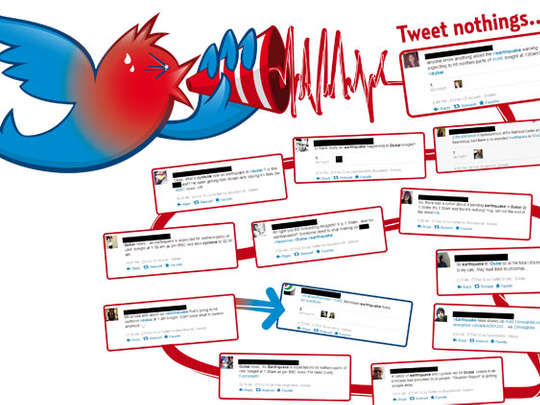
Dubai He had to give all the canned tuna he had stocked up in anticipation of an earthquake that was supposed to hit Dubai on Sunday to his two cats.
This was what resident Ziad Al Jamaan (@ziadaljamaan) shared on Twitter.
Did he lie about the tuna? Or the earthquake?
When contacted by Gulf News, he said that the tweet was a tongue-in-cheek message to those spreading the false news about the earthquake. However, not all Twitter users reacted the way Al Jamaan did.
Many Twitterers also posted tweets expressing panic. The news was later dismissed as just a rumour by an official from the National Centre of Meteorology and Seismology (NCMS).
Last Sunday's turn of events point out to an alarming fact — social networks are rife with false news.
The worrying part is not the news itself, but how easily — and fast — people share incorrect information.
A few weeks earlier, false incidents such as a fire that broke out at the Burj Khalifa and a cyclone warning were also communicated via twitter and Facebook, raising the question whether social media has become antisocial.
When news is falsely reported, there are repercussions. Gulf News asked industry expert Danish Farhan, CEO of Xische, a branding company that provides social media services in Dubai, to share his views on the subject.
Farhan said: "Traditionally, one is more likely to believe something to be a reality when they trust the source. This doesn't change with social media. The first question to ask when news breaks [on social media] is, ‘Who broke the story?'" He explained that the emergence of social media platforms has "levelled the playing field" where the public expresses opinion as well.
Quick search
"Investigating an apparent breaking story is simple — a quick Google query or a Twitter search will make things clear. It's a level playing field with more than one opinion. Those who know a story isn't true, will shout about it," Farhan said.
Of the trend of false tweets and posts, he said: "When the Dubai cyclone story hit the Blackberry network in the UAE, it was on Twitter within minutes. Despite the interest it generated, there was a segment of users, especially from the press, who verified the incident immediately."
Clare Geeves, general manager of a Dubai-based art outlet, narrated to Gulf News how she reacted to the false earthquake report. After reposting the news on her social media accounts, she learnt that it was a hoax.
She said: "I witnessed how far the rumour had spread. The earlier incident ‘hurricane due to hit Dubai' was also retweeted many times and commented on, thus proving how strong social media is."
Are we to believe that the strength of social media is based on uncensored and open policy without accountability? Jonathan Castle, a blogger and motoring writer, said social media is no more prone to misuse "than a garden fence".
"Gossip is gossip no matter how you disseminate it. It is up to the reader to check and judge the veracity of what they read."
Castle believes anonymity of online conversations allows people to behave badly, but explains that bad behaviour is bad, regardless of where it takes place. "It loops to education, personal responsibility and accountability. I prefer a course of action where you educate rather than legislate. Micromanaging social media is never going to work. Teach people about the consequences, then trust them to use good judgement."
Lack of understanding
Shamim Kassibawi, who specialises in video blogging and is a self confessed "social media-holic", said there is a lack of understanding of social media.
"It is so new in this region — and so powerful. Sadly, with the good comes the bad. Because it is so powerful, the smallest rumour can spread fast."
She urged people not to retweet news that isn't from a valid source. "Make sure you double check as it can position you as an unreliable source within the online community," Shamim said.
- 1. Admit your mistake before anybody else picks up on it, and apologise. Don't lie to cover a mistake.
- 2. If it's something simple that has gone wrong, humour is handy. People forgive easily when humour is involved. A typo; wrong link; or inaccurate information are things that can happen to the most seasoned social media user. Taking a dig at yourself in an easy, funny and effective way to rectify a mistake.
- 3. If somebody finds a mistake or error and brings it to your attention, apologise first, investigate later, and thank them publicly. This is just as relevant in the midst of a crisis. Unlike a phone call where the conversation about a bad experience is private, on social media channels, there are potentially thousands of bystanders watching and forming opinions. Every opportunity to fix a mistake is also an opportunity to win more trust, make more friends, and build a support base when things have gone awry.
How to deal with social media faux pas?
Danish Farhan, CEO of Xische, a branding company that provides social media services in Dubai, told Gulf News there are ways to cope when one makes a mistake on a social media channel.











